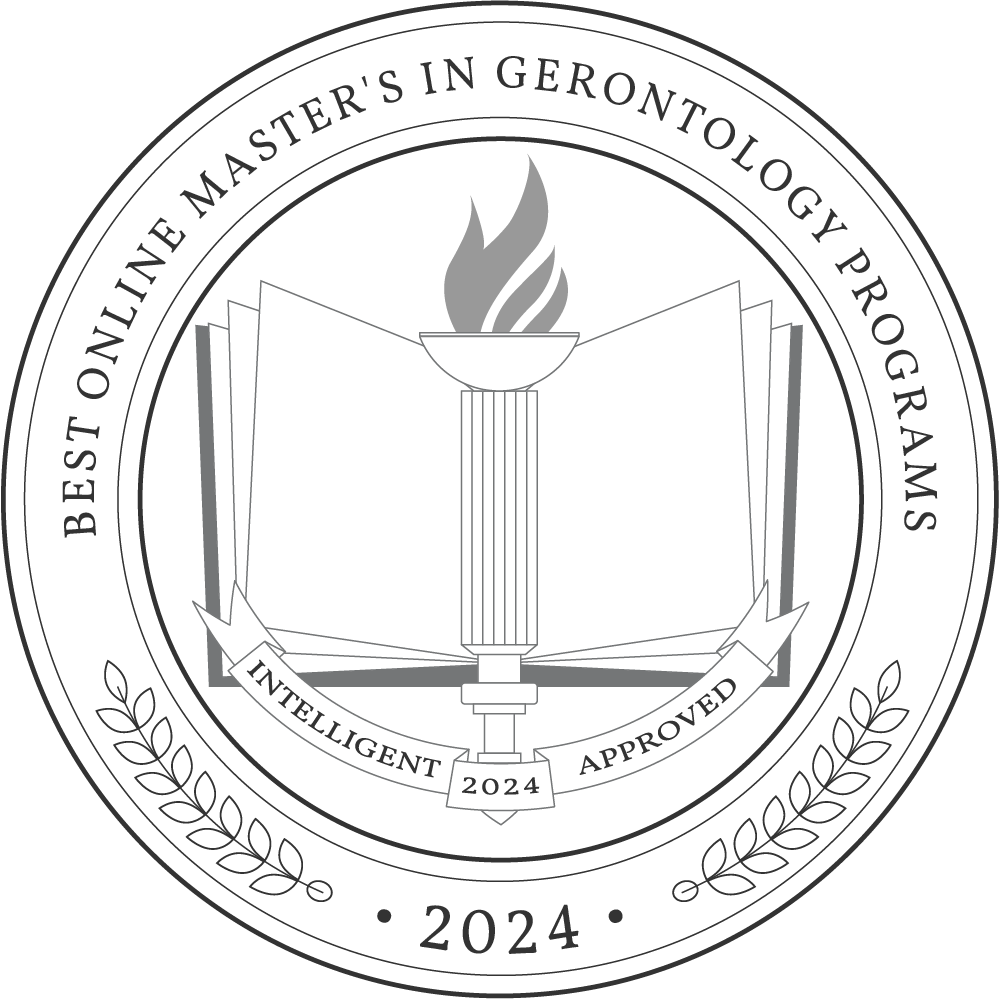Gerontology studies the factors that affect aging, specifically among older people. An online master’s degree in gerontology gives students the necessary skills to succeed in a career working with the elderly.
This degree will qualify you for several high-paying and fast-growing industries. For example, the number of jobs for occupational therapists is expected to grow at an exceptionally high rate (23%) over the next decade.
How to Choose an Online Master’s in Gerontology Program
Choose your area of study
This degree may be available as a Master of Arts (MA) or Master of Science (MS). Furthermore, many programs will allow you to select a concentration and focus your studies on a particular niche in this field, such as medical research or healthcare administration. If you already know what you would like to do after you graduate, look for programs that closely match these career goals.
Research schools and programs
You should only apply to institutions that have been approved by a DOE-recognized regional accrediting organization, such as the New England Commission of Higher Education or Northwest Commission on Colleges and Universities. These organizations evaluate schools to ensure they provide students with a high-quality education. Those who attend a school that isn’t regionally accredited may be unable to access financial aid or transfer credits to another institution if needed.
If you’re interested in healthcare administration, look for options that have programmatic accreditation from the Commission on the Accreditation of Healthcare Management Education (CAHME) as well.
Also, determine whether programs offer services such as tutoring, counseling, and career coaching to online students. To learn more about any schools that you’re interested in, you can visit the school’s website, contact an admissions counselor, follow the school on social media, or attend an in-person or virtual open house.
Prepare for tests and applications
Application requirements vary by school and program. For example, you may need to submit scores from the Graduate Management Admissions Test (GMAT) or the Graduate Record Examinations (GRE).
Additional requirements may include the following:
- Bachelor’s degree from an accredited university
- Undergraduate transcripts
- Letters of recommendation
- Personal statement
- Minimum GPA, usually 3.0
- Experience working with the elderly
- Application fees
Always contact an admissions counselor to ensure you have the most accurate information regarding requirements and deadlines.
Select your program
Before making your final decision, review your needs and goals again. Do you plan to attend school full-time or part-time? Do you want your program to be as online as possible, or are you fine with a hybrid program that has a fair amount of in-person requirements? Some programs offer asynchronous courses, which can be completed at your own pace, while others only offer synchronous courses, which involve remotely attending lectures and completing assignments at the same time as other students — which of these two online learning formats do you prefer? Your school should accommodate your scheduling needs and learning preferences.
Determine how you will pay for your degree
Completing an online master’s program has direct and indirect costs. Buying textbooks is a direct cost, while paying for childcare is an indirect cost. Consider both costs when weighing your options for paying for the degree. Work with the school’s financial aid advisor to choose the best payment option.
If you want to avoid acquiring debt, ask about payment plans, scholarships, and grants available through the school. If you must borrow money to pay for school, complete the Free Application for Federal Student Aid (FAFSA) online. Those who already work in the field should see if their employer offers tuition assistance benefits as well.
Best 26 Accredited Online Master's in Gerontology Programs
Institution Type
Status
- Intelligent Score
- Alphabetically By University Name
- Acceptance Rate
- Enrollment
- In-state Graduate Tuition
- Out-of-state Graduate Tuition
- In-state Undergraduate Tuition
- Out-of-state Undergraduate Tuition

Georgetown University School of Nursing
Intelligent Score: 99.47Undergraduate Tuition
In-state: $57,384
Out-of-state: $57,384
Graduate Tuition
In-state: $53,136
Out-of-state: $53,136
Test scores
SAT: 1380-1550
ACT: 31-35
ESTIMATED COST PER CREDIT
$2,358
DELIVERY FORMAT
Online
ACCREDITATION
Commission on Collegiate Nursing Education
REQUIRED CREDITS TO GRADUATE
40

GW School of Nursing
Intelligent Score: 98.74Undergraduate Tuition
In-state: $55,961
Out-of-state: $55,961
Graduate Tuition
In-state: $31,770
Out-of-state: $31,770
Test scores
SAT: 1270-1450
ACT: 30-33
ESTIMATED COST PER CREDIT
$1,395
DELIVERY FORMAT
Online. On- Campus
ACCREDITATION
Commission on Collegiate Nursing Education
REQUIRED CREDITS TO GRADUATE
48

Stony Brook School of Nursing
Intelligent Score: 98.41Undergraduate Tuition
In-state: $7,070
Out-of-state: $24,740
Graduate Tuition
In-state: $11,310
Out-of-state: $11,310
Test scores
SAT: 1230-1440
ACT: 26-32
ESTIMATED COST PER CREDIT
Resident: $640
Non-Resident: $1,132
DELIVERY FORMAT
Online. On- Campus
ACCREDITATION
Commission on Collegiate Nursing Education
REQUIRED CREDITS TO GRADUATE
45

University of Connecticut
Intelligent Score: 96.59Undergraduate Tuition
In-state: $14,406
Out-of-state: $37,074
Graduate Tuition
In-state: $16,908
Out-of-state: $16,908
Test scores
SAT: 1170-1390
ACT: 27-32
ESTIMATED COST PER CREDIT
$925
DELIVERY FORMAT
Online. On- Campus
ACCREDITATION
Commission on Collegiate Nursing Education
REQUIRED CREDITS TO GRADUATE
45

Michigan State University
Intelligent Score: 96.17Undergraduate Tuition
In-state: $15,555
Out-of-state: $40,384
Graduate Tuition
In-state: $18,858
Out-of-state: $18,858
Test scores
SAT: 1100-1300
ACT: 23-29
ESTIMATED COST PER CREDIT
In-State: $838
Out-of-State: $863
DELIVERY FORMAT
Online
ACCREDITATION
Higher Learning Commission
REQUIRED CREDITS TO GRADUATE
54

University of Nebraska Omaha
Intelligent Score: 94.4Undergraduate Tuition
In-state: $7,770
Out-of-state: $24,900
Graduate Tuition
In-state: $6,138
Out-of-state: $6,138
Test scores
SAT: 1110-1320
ACT: 22-28
ESTIMATED COST PER CREDIT
Resident:: $375
Non-Resident: $617
DELIVERY FORMAT
Online. On- Campus
ACCREDITATION
Higher Learning Commission
REQUIRED CREDITS TO GRADUATE
36

University of Louisiana at Monroe
Intelligent Score: 94.38Undergraduate Tuition
In-state: $5,407
Out-of-state: $19,135
Graduate Tuition
In-state: $5,511
Out-of-state: $5,511
Test scores
SAT: 1000-1210
ACT: 20-26
ESTIMATED COST PER CREDIT
$375
DELIVERY FORMAT
Online
ACCREDITATION
Southern Association of Colleges and Schools Commission on Colleges
REQUIRED CREDITS TO GRADUATE
38

Iowa State University
Intelligent Score: 94.32Undergraduate Tuition
In-state: $8,042
Out-of-state: $23,230
Graduate Tuition
In-state: $9,758
Out-of-state: $9,758
Test scores
SAT: 1010-1310
ACT: 21-28
ESTIMATED COST PER CREDIT
Resident: $881
Non-Resident: $2,231
DELIVERY FORMAT
Online. On- Campus
ACCREDITATION
Higher Learning Commission
REQUIRED CREDITS TO GRADUATE
36

University of South Carolina
Intelligent Score: 94.07Undergraduate Tuition
In-state: $12,288
Out-of-state: $33,528
Graduate Tuition
In-state: $13,737
Out-of-state: $13,737
Test scores
SAT: 1140-1340
ACT: 25-31
ESTIMATED COST PER CREDIT
$2,137
DELIVERY FORMAT
Online
ACCREDITATION
Western Association of Schools and Colleges
REQUIRED CREDITS TO GRADUATE
44

Kansas State University
Intelligent Score: 93.07Undergraduate Tuition
In-state: $9,375
Out-of-state: $25,251
Graduate Tuition
In-state: $10,212
Out-of-state: $10,212
Test scores
SAT: N/A
ACT: N/A
ESTIMATED COST PER CREDIT
$510
DELIVERY FORMAT
Online
ACCREDITATION
Higher Learning Commission
REQUIRED CREDITS TO GRADUATE
30

Drexel University
Intelligent Score: 92.55Undergraduate Tuition
In-state: $53,868
Out-of-state: $53,868
Graduate Tuition
In-state: $36,234
Out-of-state: $36,234
Test scores
SAT: 1180-1380
ACT: 25-31
ESTIMATED COST PER CREDIT
$1, 069
DELIVERY FORMAT
Online. On- Campus
ACCREDITATION
Middle States Commission on Higher Education
REQUIRED CREDITS TO GRADUATE
57

University of Florida
Intelligent Score: 91.95Undergraduate Tuition
In-state: $4,477
Out-of-state: $25,694
Graduate Tuition
In-state: $10,770
Out-of-state: $10,770
Test scores
SAT: 1290-1460
ACT: 29-33
ESTIMATED COST PER CREDIT
$585
DELIVERY FORMAT
Online
ACCREDITATION
Southern Association of Colleges and Schools Commission on Colleges
REQUIRED CREDITS TO GRADUATE
36

Wichita State University
Intelligent Score: 91.48Undergraduate Tuition
In-state: $6,843
Out-of-state: $16,208
Graduate Tuition
In-state: $5,544
Out-of-state: $5,544
Test scores
SAT: 1020-1250
ACT: 20-27
ESTIMATED COST PER CREDIT
$307
DELIVERY FORMAT
Online
ACCREDITATION
Higher Learning Commission
REQUIRED CREDITS TO GRADUATE
36

University of Utah
Intelligent Score: 89.69Undergraduate Tuition
In-state: $7,412
Out-of-state: $26,017
Graduate Tuition
In-state: $6,666
Out-of-state: $6,666
Test scores
SAT: 1130-1350
ACT: 22-29
ESTIMATED COST PER CREDIT
In-State: $320
Out-of-State: $938
DELIVERY FORMAT
Online
ACCREDITATION
Commission on Collegiate Nursing Education
REQUIRED CREDITS TO GRADUATE
33-34

Texas Tech University
Intelligent Score: 89.57Undergraduate Tuition
In-state: $8,683
Out-of-state: $20,953
Graduate Tuition
In-state: $6,788
Out-of-state: $6,788
Test scores
SAT: 1070-1240
ACT: 22-27
ESTIMATED COST PER CREDIT
Resident:: $961
Non-Resident: $1,797
DELIVERY FORMAT
Online
ACCREDITATION
Southern Association of Colleges and Schools Commission on Colleges
REQUIRED CREDITS TO GRADUATE
36

Seton Hall University
Intelligent Score: 88.26Undergraduate Tuition
In-state: $42,920
Out-of-state: $42,920
Graduate Tuition
In-state: $24,372
Out-of-state: $24,372
Test scores
SAT: 1150-1310
ACT: 25-30
ESTIMATED COST PER CREDIT
$1,383
DELIVERY FORMAT
Online
ACCREDITATION
Commission on Collegiate Nursing Education
REQUIRED CREDITS TO GRADUATE
48

McDaniel College
Intelligent Score: 87.8Undergraduate Tuition
In-state: $45,876
Out-of-state: $45,876
Graduate Tuition
In-state: $9,468
Out-of-state: $9,468
Test scores
SAT: N/A
ACT: N/A
ESTIMATED COST PER CREDIT
$537
DELIVERY FORMAT
Online. On- Campus
ACCREDITATION
Middle States Commission on Higher Education
REQUIRED CREDITS TO GRADUATE
30-36

Webster University
Intelligent Score: 87.61Undergraduate Tuition
In-state: $28,500
Out-of-state: $28,500
Graduate Tuition
In-state: $13,500
Out-of-state: $13,500
Test scores
SAT: 1078-1260
ACT: 20-27
ESTIMATED COST PER CREDIT
$700
DELIVERY FORMAT
Online
ACCREDITATION
Higher Learning Commission
REQUIRED CREDITS TO GRADUATE
36
How We Rank Schools
We concentrated our research on programs that offer degrees in gerontology. Students typically earn a Master of Arts (MA) or a Master of Science (MS) degree in this field.
To ensure flexibility, we focused on reviewing programs that can be completed entirely or primarily online. In instances where schools offer classes both on-campus and online, students may have the option of completing the program through a mixture of in-person and online coursework.
All of the schools on our list have regional accreditation. This confirms that they meet high standards of quality for postsecondary education. Several programs are also accredited by the Commission on the Accreditation of Healthcare Management Education (CAHME).
We evaluated the programs based on their flexibility, faculty, cost, outcomes, and reputation. Then, we calculated an Intelligent Score for each program on a scale of 0 to 100. For a more extensive explanation, check out Our Ranking Methodology.
What Can You Expect from an Online Master’s in Gerontology Program?
Most master’s degree programs in gerontology require between 30 and 36 credit hours, typically taking about two years for full-time students. If the school offers an accelerated program, you may be able to complete it in one year. You may need more than two years to complete this program if you have many work and family responsibilities, which is also allowed in online programs.
These programs often require supervised practicums or other fieldwork experiences where you practice what you have learned in your online courses. Common settings for these in-person requirements include:
- Hospitals
- Long-term care facilities
- Research facilities
- Retirement homes
- Non-profit organizations
- Government agencies
- Mental health agencies
Potential courses you’ll take in an online master’s in gerontology degree program
- Geriatric Pharmacology. Students learn about the most common mental and physical health problems among older adults and how medications help or harm them. This course focuses on medication benefits, risks, schedules, and interactions, as well as what to do in a medical emergency.
- Psychology of Aging. This course covers the psychological changes that affect the quality of life of people as they age, such as memory loss, mental illness, and grieving the loss of friends and family members. Students will learn how to recognize signs of psychological impairments and how to help an aging client get the treatment they need.
- Policies Affecting the Aging Population. Students learn about laws and regulations such as Medicare, Social Security, and the Elder Justice Act.
- Perspectives in Gerontology. This course typically offers an overview of the many things affecting aging today, such as research, politics, careers, and social issues. Other areas addressed may include theories on aging, new technologies, ethics, and the various environments in which older people can thrive.
What Can You Do With an Online Master’s in Gerontology?
Career outlook
The career outlook for individuals with a degree in gerontology is promising, driven by the significant demographic shift toward an aging population. The World Health Organization estimates that the global population aged 60 and over will nearly double from 12% in 2015 to 22% in 2050. As a result, there is a growing need for professionals who can work with and support older adults. Here are some key career options in gerontology:
- Health education specialist — Some health education specialists work in clinical settings to help patients understand their conditions and treatments, while others develop materials and campaigns to promote public health.
- Median annual salary: $62,860
- Projected employment growth (through 2032): 7%
- New job openings projected: 6,600 annually
- Health services manager — Manage a healthcare facility or department and supervise medical staff.
- Median annual salary: $110,680
- Projected employment growth (through 2032): 28%
- New job openings projected: 54,700 annually
- Social or community service manager — Oversee operations and secure funding for programs that support public well-being.
- Median annual salary: $77,030
- Projected employment growth (through 2032): 9%
- New job openings projected: 16,000 annually
Online Master’s Degree in Gerontology Frequently Asked Questions
How do I apply to an online master's in gerontology degree program?
Online master’s degree programs in gerontology do an excellent job of making the application process as simple as possible. However, each program may require different steps. To get started with an application, contact an admissions counselor at your selected school to ensure you understand their guidelines.
Documents you may need to submit include:
How much does an online master's in gerontology degree cost?
The average annual tuition for graduate school is $12,596 at public institutions and $28,017 at private institutions. Private schools tend to be more expensive than public schools, though public schools usually charge out-of-state students a much higher tuition rate than in-state students.
How long does it take to earn an online master's in gerontology degree?
Master’s in gerontology programs typically take between one and three years to complete. Factors that can change the length of your program include how many courses you take each semester and the number of credit hours required for completion.
Is an online master's in gerontology worth it?
An online degree in gerontology is a valuable investment that not only opens doors to diverse career opportunities but also allows individuals to make a positive impact on the well-being of older adults in an aging society. The skills and knowledge gained through this program are essential for addressing the unique challenges and opportunities associated with an aging population.
Online programs offer the flexibility to balance educational tasks with professional and personal commitments, allowing students to take classes wherever and whenever it is convenient for them. Online gerontology programs also offer extensive networking opportunities with peers, faculty, and industry professionals across the country and even globally.
